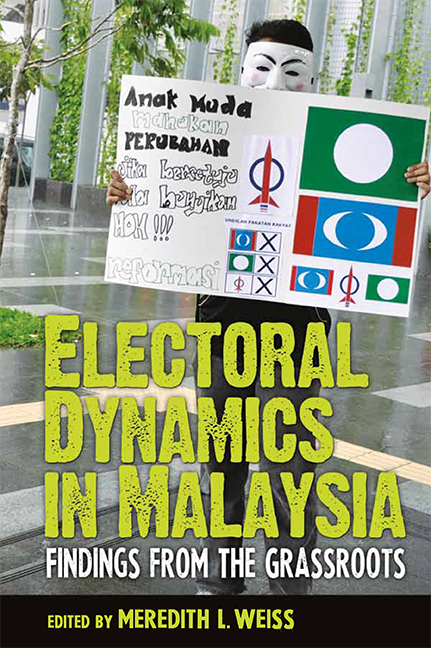Book contents
- Frontmatter
- Contents
- List of Tables
- Foreword
- Acknowledgements
- Glossary & Acronyms
- Chapter 1 Introduction: Patterns and Puzzles in Malaysian Electoral Dynamics
- Chapter 2 Arau, Perlis: The Irresistible Charm of Warlords, Women and Rewards?
- Chapter 3 Padang Serai, Kedah: Between the ‘Personal Touch’ and the Generous Hand
- Chapter 4 Kuala Nerus, Terengganu: New Malay Politics?
- Chapter 5 Balik Pulau, Penang: Home Run for the Home Boys
- Chapter 6 Lumut, Perak: Patronage, Clientelism and the Post-Coup Order
- Chapter 7 Kuantan, Pahang: Revealing the Ordinary
- Chapter 8 Pandan, Selangor: New Electoral Dynamics in Urban Malaysia
- Chapter 9 Kepong and Titiwangsa, Kuala Lumpur: Messages or Money?
- Chapter 10 Rembau, Negeri Sembilan: Personalities and Promises
- Chapter 11 Pulai, Johor: A Tale of Two Coalitions
- Chapter 12 Gelang Patah, Johor: Did Lim Kit Siang Truly Win His Last Gamble?
- Chapter 13 Kota Marudu and Keningau, Sabah: Personality, Patronage and Parochial Politics
- Chapter 14 Tuaran, Sabah: Party Loyalty and Rational Voting
- Chapter 15 Kota Kinabalu, Sabah: BN Loses Its ‘Fixed Deposit’
- Chapter 16 Beaufort, Sabah: Whither Lajim's Popularity?
- Chapter 17 Sibu and Lanang, Sarawak: Defeat of the Bosses
- Contributors
Chapter 7 - Kuantan, Pahang: Revealing the Ordinary
Published online by Cambridge University Press: 10 November 2017
- Frontmatter
- Contents
- List of Tables
- Foreword
- Acknowledgements
- Glossary & Acronyms
- Chapter 1 Introduction: Patterns and Puzzles in Malaysian Electoral Dynamics
- Chapter 2 Arau, Perlis: The Irresistible Charm of Warlords, Women and Rewards?
- Chapter 3 Padang Serai, Kedah: Between the ‘Personal Touch’ and the Generous Hand
- Chapter 4 Kuala Nerus, Terengganu: New Malay Politics?
- Chapter 5 Balik Pulau, Penang: Home Run for the Home Boys
- Chapter 6 Lumut, Perak: Patronage, Clientelism and the Post-Coup Order
- Chapter 7 Kuantan, Pahang: Revealing the Ordinary
- Chapter 8 Pandan, Selangor: New Electoral Dynamics in Urban Malaysia
- Chapter 9 Kepong and Titiwangsa, Kuala Lumpur: Messages or Money?
- Chapter 10 Rembau, Negeri Sembilan: Personalities and Promises
- Chapter 11 Pulai, Johor: A Tale of Two Coalitions
- Chapter 12 Gelang Patah, Johor: Did Lim Kit Siang Truly Win His Last Gamble?
- Chapter 13 Kota Marudu and Keningau, Sabah: Personality, Patronage and Parochial Politics
- Chapter 14 Tuaran, Sabah: Party Loyalty and Rational Voting
- Chapter 15 Kota Kinabalu, Sabah: BN Loses Its ‘Fixed Deposit’
- Chapter 16 Beaufort, Sabah: Whither Lajim's Popularity?
- Chapter 17 Sibu and Lanang, Sarawak: Defeat of the Bosses
- Contributors
Summary
Kuantan, the ninth largest city in Malaysia, is the state capital of Pahang. In most dimensions the city is fairly average by Malaysian standards. The state as a whole ranked eighth of thirteen states in Malaysia in terms of growth rate for 2009–12 (4.4 per cent) as well as incidence of poverty (1.3 per cent) (Jabatan Perangkaan Malaysia 2013, pp. 3, 9). In terms of voters' racial demographics, Kuantan's parliamentary area has a slightly higher than the national average percentage of Chinese voters and slightly lower than average percentage of both Malay and Indian voters. One state seat (Teruntum) in Kuantan has a non-Malay majority, while one, Inderapura, is nearly entirely Malay. Heated up by a looming local environmental issue, the recent general elections in Kuantan, in which Parti Keadilan Rakyat (PKR) and Parti Islam SeMalaysia (PAS) on the Pakatan Rakyat (Pakatan) side took on the United Malays National Organisation (UMNO) and Malaysian Chinese Association (MCA) on the Barisan Nasional (BN) side, were fundamentally average, and thus a good microcosm of Malaysian electoral politics.
Three notable aspects distinguished the campaigns in Kuantan: the issue of the Lynas rare earths plant, the campaign's ‘anchoring’ to Prime Minister Najib Razak and the candidates' emphasis on a ‘personal touch’. The progress of these campaigns sheds light on what are considered to be general trends of Malaysian politics and reveals the mechanics behind what is considered to be the ‘ordinary’ of Malaysian electoral dynamics.
Progress of the campaign
Kuantan has typically been a relatively calm district in terms of politics and has had a strong BN presence, much like most of the rest of the country. It has rarely been the subject of debate among Malaysians not from there. However, one issue arose in 2011 that changed all of this: the Lynas issue, which put Kuantan on Malaysia's political map.
- Type
- Chapter
- Information
- Electoral Dynamics in MalaysiaFindings from the Grassroots, pp. 95 - 106Publisher: ISEAS–Yusof Ishak InstitutePrint publication year: 2013



